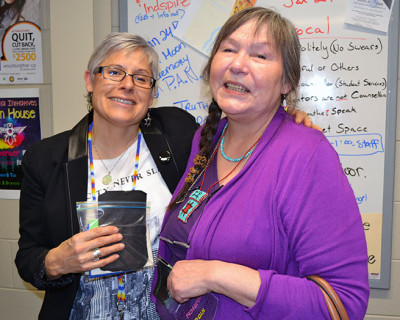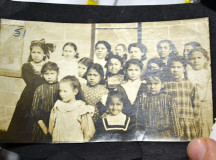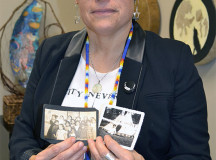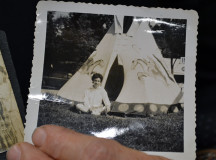Supporting aboriginal education at Sheridan

Paula Laing, a student success and transition advisor for the Aboriginal Initiatives Office and Vina Augustine, a Mi’kmaq and Elder from New Brunswick. (Photography by Elise Morton/ The Sheridan Sun)
STORY AND PHOTOGRAPHY BY ELISE MORTON
The Sheridan community came together to brainstorm ideas during an event on Friday about how the college can support reconciliation and indigenous learners.
The Truth and Reconciliation Commission of Canada (TRC) issued a challenge to every post-secondary institution in the country to support indigenous students and aboriginal education.
Colleges and Institutes Canada, a national organization has provided colleges with the Indigenous Education Protocol – a guide that contains seven principles to help colleges to change and grow.
Sheridan is already implementing this support by having an Aboriginal Initiatives Office at Trafalgar for three years in partnership with Mohawk College, but there are still areas for improvement.
“I do believe that now we have an opportunity here in this day and age to make things right and people want to know themselves if there is really an opportunity to heal,” said Paula Laing, a student success and transition advisor for the Aboriginal Initiatives Office.
MORE RELATED TO THIS STORY:
- Medicine Wheel ways to wellness
- ‘We need to become the educated masses’
- Giving a voice to aboriginal culture
As a part of the Indian Residential School Settlement Agreement, the federal government created the TRC to document, record and share with Canadians the horrific stories of the survivors. Their six-volume final report released in December, includes a chapter on education for reconciliation and issued a challenge to Canadian colleges and universities.
Yves Y Pelletier, a senior consultant at Academica Group was commissioned to write a report to help Sheridan create a strategy for indigenous education and assess where the college stands.
“Reconciliation is for all Canadians to make this land a better land,” said Pelletier. “It’s about understanding more about each other and it’s about moving forward.”
During a reconciliation and support for First Nations students event on Friday, Pelletier gave Sheridan faculty, staff and students a brief review about the dark history of the Indian Residential Schools and the importance of the TRC.
The TRC’s 19-minute video that recounted the survivor’s stories brought several audience members to tears.
Still, many people found the event was too short and the presentation should have included more facts.
“It’s part of the history of Canada and people need to learn more about the abuse the aboriginal, First Nations, Metis and Inuit children suffered and the effect it had and carried on to their children,” said Vina Augustine, a Mi’kmaq and Elder from New Brunswick.
“A lot of people didn’t return, they died and some children were born from the rapes that incurred in the schools and some people actually committed suicide because of what happened to them.”
- (Photography by Elise Morton/ The Sheridan Sun)
- Paula Laing, a student success and transition advisor for the Aboriginal Initiatives Office (Photography by Elise Morton/ The Sheridan Sun)
- (Photography by Elise Morton/ The Sheridan Sun)
The main purpose of the Shaping Sheridan’s Commitment to Truth and Reconciliation and Support for First Nation students event was to get the audience to share ideas about how the college can support reconciliation and Indigenous learners, educate the community and strengthen it’s growth.
“I was actually pretty surprised by the suggestions that were made because both the non-aboriginal and aboriginal students had the same ideas so it shows that we are kind of validated in what we want,” said Kayla Parisien, a first-year Social Work student.
“I enjoyed the event, but I would have liked to have had a bit more of a discussion,” said Parisien. “I feel like the discussion didn’t go anywhere and it just went like this is what we need because considering how many people were there we only heard five opinions.”
Having an aboriginal course at Sheridan, creating a day of remembrance, having more aboriginal staff and employees and having a survivor come in and share their story were a few of the ideas proposed. At the end of the event all the ideas were collected by Pelletier to be recorded and included within his report for Sheridan College.
“I thought it was really refreshing and I think it shed a light on a really important issue,” said Miguel Turato, a Sheridan employee. “As an aboriginal individual it’s all that more important for us to see change and inspire change and engage.”







